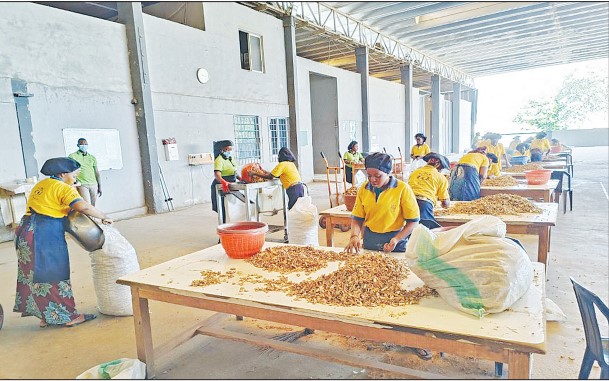Boosting Africa’s spice industry through finance

FOR many smallholder farmers, spices are more than a crop and that is they are a lifeline. The income earned from cloves, turmeric, cinnamon, and black pepper pays for school fees, medical bills, and household needs.
Yet, despite the abundance of these high-value crops, many farmers have long struggled to find reliable buyers who offer fair prices and steady markets. It is in this landscape that Horizon Group Africa has become a game-changer.
Working directly with more than 3,000 farmers across Nigeria, Tanzania, and Madagascar, the company has built a trusted bridge between African growers and the kitchens, restaurants, and food industries of Europe, Asia, and the United States.
And now, thanks to a 5 million US dollars loan from Aavishkaar Capital’s Global Supply Chain Support Fund (GSCSF), Horizon is preparing to scale its operations to meet the surging global demand for organic and sustainably sourced spices.
This latest funding is part of a larger 250 million US dollars fund managed by Aavishkaar Capital in partnership with German state-owned development bank KfW, designed to strengthen sustainable supply chains in Africa and Asia. For Horizon Group, the investment represents both financial muscle and strategic expertise as it aims to become one of Africa’s leading spice processors.
Horizon Group’s journey began in 2006 in Nigeria as a trading business dealing in agrocommodities, processed foods, and furniture. But a turning point came in 2017, when the company shifted focus to the spice trade. The decision was strategic: Africa, with its rich soils and favourable climates, has long been home to some of the world’s most prized spices.
ALSO READ: Lost in translation, how Africa is trying to close the AI language gap
“Nigeria, Tanzania, and Madagascar each have unique strengths in spice cultivation,” explains Horizon CEO, Jomy Antony. “Ginger and turmeric thrive in Nigeria, cloves and cinnamon flourish in Tanzania, while Madagascar is renowned for cardamom and black pepper.
Together, they give Africa a strong comparative advantage in the spice trade.” With processing facilities across the three countries, Horizon is able to handle both organic and conventional spices, catering to the growing demand for transparency and traceability in global food supply chains. Central to Horizon’s model are the thousands of farmers it partners with.
These growers, often operating small plots of land, receive training in good agricultural practices to improve yields and meet the strict standards of organic certification.
Horizon has also organised them into cooperatives, enabling bulk certification, collective bargaining, and easier access to financing. This people-centred approach is what attracted Aavishkaar Capital to Horizon.
“We deeply value Horizon’s impactful farm extension works with more than 3,000 farmers across remote regions of Tanzania, Madagascar, and Nigeria,” says Darren Lobo, Director at Aavishkaar Capital.
“It is rare to find a company that combines deep farmer relationships with strong international customer ties.” The timing of Horizon’s growth could not be better.
Globally, demand for spices and seasonings has been rising, fuelled by changing consumer tastes, the growth of ethnic cuisines, and increasing health consciousness. The organic food movement has also boosted interest in naturally grown spices, which are not only seen as healthier but also command higher prices.
The European Union and the United States, in particular, have become lucrative markets for organic ginger, turmeric, and cinnamon—spices often hailed for their medicinal properties. Asia, too, is seeing renewed demand as traditional spicebased remedies gain popularity in urban centres.
According to industry estimates, the global spice trade is valued at over 18 billion US dollars annually, and Africa’s contribution remains underexploited. With the right infrastructure, companies like Horizon could significantly increase the continent’s share of this market.
Aavishkaar Capital’s loan to Horizon is designed to meet working capital needs, especially for the purchase of raw materials to fulfil increasing client orders. But more than money, it brings global networks, governance expertise, and long-term vision.
“We are pleased to partner with Aavishkaar Capital as we embark on the next phase of our growth journey,” notes Antony. “Their experience in scaling businesses, enabling access to international markets, and unlocking capital will be invaluable as we build Horizon into Africa’s leading spice processing company.” The partnership also highlights a growing trend of impact investment—funding that not only seeks commercial returns but also delivers measurable social and environmental benefits.
“Our investment in Horizon reflects KfW’s commitment to strengthening sustainable supply chains across Africa and Asia,” explains Dr Markus Aschendorf, Head of Division at KfW. “We believe that purpose-driven capital can catalyse meaningful ESG transformation while unlocking inclusive growth. Horizon’s work in ethical sourcing and regenerative agriculture aligns perfectly with our vision.”
ALSO READ: Silicon savannah: Futuristic creative cities driving Tanzania’s growth
The GSCSF’s previous African investments tell a similar story of sustainability and global competitiveness. From Hela Apparel Holdings PLC, known for ethically produced clothing, to Balaji EPZ, a denim manufacturer for global brands, and Privamnuts, a Kenyan exporter of macadamia nuts, the fund has consistently backed businesses that connect Africa to world markets while creating jobs and promoting fair practices.
Together, these investments show how impact-driven capital is reshaping supply chains, shifting them from extractive models to inclusive systems that prioritise both producers and consumers.
With the new funding, Horizon Group plans to strengthen its supply base, expand processing capacity, and deepen its engagement with farming communities. By increasing organic cultivation, the company aims not only to capture higher margins but also to contribute to climate resilience and soil health.
The broader vision is to position Africa as a global hub for highquality, ethically sourced spices. This ambition, Antony says, is not just about profits: “It is about showing the world that Africa can lead in quality, sustainability, and reliability. It is about giving farmers dignity and ensuring their hard work is recognised internationally.” In the end, the story of Horizon Group and Aavishkaar Capital’s investment is more than just a financial transaction
. It is about reshaping narratives: turning smallholder struggles into global success, transforming undervalued crops into international commodities, and proving that purpose-driven partnerships can unlock Africa’s vast agricultural potential.
As spices from African soils find their way into kitchens and cuisines around the world, they carry with them the dreams of thousands of farmers, the vision of determined entrepreneurs, and the belief that sustainable business can be a force for profound change.
With Aavishkaar’s US dollars 5 million boost, Horizon is well on its way to ensuring that Africa’s spices not only flavour global dishes but also season the future with opportunity and hope.





